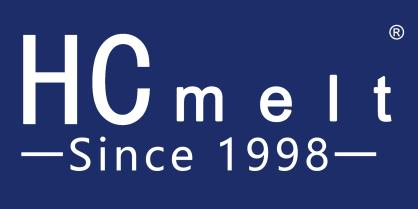

Environment-friendly hot melt adhesive refers to a class of adhesive products designed to minimize environmental impact while delivering strong bonding and industrial performance. By avoiding harmful solvents, reducing emissions, and often incorporating renewable or recyclable components, these adhesives support sustainable manufacturing and safer product life cycles. Below, we explore what makes a hot melt adhesive “environment-friendly,” its benefits, how it's made, key applications, and how HUACHUN plays a role in this sector.
A hot melt adhesive (HMA) is a thermoplastic adhesive that is solid at room temperature, melts when heated, and solidifies upon cooling to form bonds between surfaces.
An adhesive qualifies as environment-friendly when it meets several of the following criteria:
Zero or low solvent content: No volatile organic compounds (VOCs) are used, helping reduce air pollution.
Energy-efficient processing: Fast setting / cooling, efficient melting, and lower energy use in production and application.
Safer ingredients: Use of non-toxic, non-hazardous materials; avoidance of heavy metals or harmful additives.
Renewable or bio-based raw materials: Polymers or additives derived from plants, biodegradable materials, or recycled sources.
Recyclability / reduced waste: Adhesives that do not interfere with recycling of bonded materials; either because they degrade, or can be separated, or leave harmless residues.
To achieve environmental friendliness, hot melt adhesives are formulated using combinations of:
| Component | Conventional vs. Eco-Friendly Options | Environmental Advantage |
|---|---|---|
| Base polymer | EVA, PO, PA; or bio-based polymers like polylactic acid (PLA), polyesters from renewable oils. | Using bio-based reduces fossil dependence; some are compostable. |
| Tackifiers / Resins | Traditional petroleum-derived resins vs. modified natural resins, hydrogenated resins. | Lower toxicity, better biodegradability. |
| Additives (plasticizers, stabilizers, etc.) | Using non-hazardous, regulatory-approved additives. | Minimizes health risks and environmental persistence. |
| Form (stick, block, pellet) | Solid forms only; no need for carry-over solvent or water. | Eliminates drying phase; reduces energy and emissions. |
Here are several advantages of choosing an environment-friendly hot melt adhesive:
Reduced VOCs and air pollutants Since these adhesives rely on thermoplastic melting, no or very little organic solvent is used. This lowers emissions of volatile compounds.
Faster bonding and process speed The adhesive sets quickly upon cooling; no drying step. This means less energy, quicker assembly lines, and higher productivity.
Better health and safety Less exposure to solvents, fewer toxic residues; safer handling for workers and downstream users.
Recycling friendly / reduced waste Adhesives that do not contaminate recyclable materials or that can decompose reduce landfill load. Bio-based or degradable adhesives contribute here.
Compliance with regulations and consumer demand As regulators tighten environmental laws (e.g., restricting VOCs, demanding biodegradable components), eco-friendly adhesives help companies stay compliant. Consumers also increasingly expect sustainability.
While many advantages exist, there are trade-offs to consider:
Cost: Bio-based polymers or greener additives may be more expensive than traditional ones.
Performance under extreme conditions: High temperature, moisture, or chemical exposure may challenge some eco-formulations.
Supply chain & consistent quality: Sourcing renewable raw materials, maintaining consistency batch to batch, and ensuring certifications can be more complex.
Biodegradability vs. durability: Balancing long life with ability to degrade at end of life without causing unintended breakdown during use.
Environment-friendly hot melt adhesives are used across many sectors, for example:
Packaging (carton sealing, gift boxes, paper & PE hybrids)
Book binding, printing, lamination
Furniture, wood edge banding
Hygiene products, non-woven fabrics
Shoe & leather industry
Electronics & filters
HUACHUN is a Chinese company with deep experience in producing environment-friendly hot melt adhesives. Some highlights:
Established & capable: Founded in 1998, with large production capacity and advanced technology.
Wide product range: HUACHUN offers glue sticks, blocks, and pellets; types include EVA, PO, PA, APAO, etc.
Strict quality control: Uses high quality raw materials, with testing to ensure stable and reliable adhesives.
Diverse applications: Their adhesives serve industries like packaging, book binding, fragrance filters, shoes, etc.
If you are seeking environment-friendly hot melts for packaging lines, furniture bonding, hygiene products, or other applications, HUACHUN appears to be equipped to supply both standard and customized adhesives to meet performance and sustainability targets.
When choosing an adhesive, consider:
Bonding requirements: What substrates (paper, plastic, wood, fabric) and what strength is needed?
Operating temperatures: Melt temperature, service temperature, exposure to heat or cold.
Regulatory & sustainability goals: Do you need biodegradable, compostable, certified bio-based, low VOC, food contact safe, etc.?
Application method: Are you using bulk pellets, blocks, glue guns, extruders?
Lifecycle considerations: End-of-life disposal or recycling, durability vs. degradability.
Environment-friendly hot melt adhesives offer a powerful way to combine industrial strength with sustainability. By eliminating harmful solvents, using renewable or safer raw materials, and enabling faster, cleaner processing, they support both product performance and environmental responsibility.
For businesses or manufacturers seeking reliable suppliers in this space, HUACHUN stands out with its long history, broad product line, firm quality control, and focus on environment-friendly hot melt adhesives. If you need adhesives for packaging, furniture, hygiene, or other sectors, exploring HUACHUN’s offerings could be a practical step toward greener operations.
Previous: How To Use Hot Melt Adhesive?